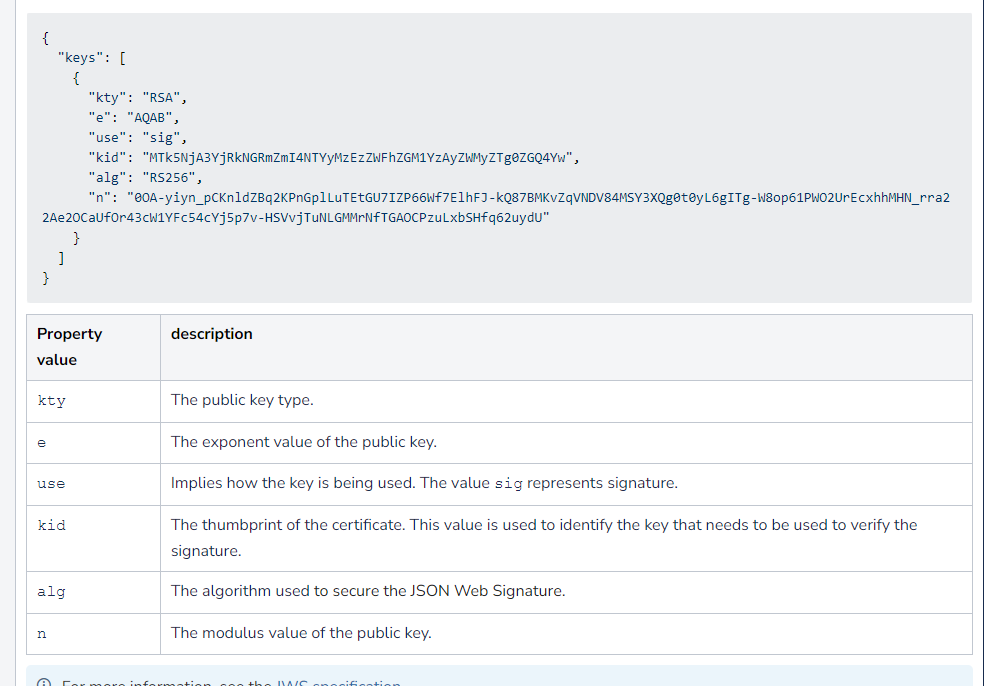I have the below JWT token,
eyJhbGciOiJIUzUxMiIsInR5cCI6IkpXVCJ9.eyJpc3MiOiJjbGllbnRpZCIsImF1ZCI6ImNsaWVudGlkIiwic3ViIjoiMTIzIiwiYSI6IjQ1NiIsImlhdCI6MTYyMTc5OTU5OCwiZXhwIjoxNjIxNzk5NjU4fQ.hglbX63zhPwTOsB-zSiOMfxEKl5OaIk6zX1o9-LEhP3nro8fa5_3QyIH7I5971j-xuO1bccX1TOh0kNcQ-ACAg
Which is generated using,
public static string GenerateToken(string key, string a1, string a2)
{
var securityKey = new SymmetricSecurityKey(Encoding.UTF8.GetBytes(key));
var token = new JwtSecurityToken(
claims: new Claim[]
{
new Claim(JwtRegisteredClaimNames.Iss, "clientid"),
new Claim(JwtRegisteredClaimNames.Aud, "clientid"),
new Claim(JwtRegisteredClaimNames.Sub, a1),
new Claim("a", a2),
new Claim(JwtRegisteredClaimNames.Iat, DateTimeOffset.UtcNow.ToUnixTimeSeconds().ToString(), ClaimValueTypes.Integer64),
},
//notBefore: new DateTimeOffset(DateTime.Now).DateTime,
expires: new DateTimeOffset(DateTime.Now.AddMinutes(1)).DateTime,
signingCredentials: new SigningCredentials(securityKey, SecurityAlgorithms.HmacSha512)
);
return new JwtSecurityTokenHandler().WriteToken(token);
}
var key = "Ym7AD3OT2kpuIRcVAXCweYhV64B0Oi9ETAO6XRbqB8LDL3tF4bMk9x/59PljcGbP5v38BSzCjD1VTwuO6iWA8uzDVAjw2fMNfcT2/LyRlMOsynblo3envlivtgHnKkZj6HqRrG5ltgwy5NsCQ7WwwYPkldhLTF+wUYAnq28+QnU=";
// Key is test
var token = GenerateToken(key, "123", "456");
After getting token I am validating using below code,
var key = "Ym7AD3OT2kpuIRcVAXCweYhV64B0Oi9ETAO6XRbqB8LDL3tF4bMk9x/59PljcGbP5v38BSzCjD1VTwuO6iWA8uzDVAjw2fMNfcT2/LyRlMOsynblo3envlivtgHnKkZj6HqRrG5ltgwy5NsCQ7WwwYPkldhLTF+wUYAnq28+QnU=";
// key is test
var hmac = new HMACSHA512(Convert.FromBase64String(key));
var validationParameters = new TokenValidationParameters
{
ValidAudience = "clientid",
ValidIssuer = "clientid",
IssuerSigningKey = new SymmetricSecurityKey(hmac.Key)
};
var tokenHandler = new JwtSecurityTokenHandler();
return tokenHandler.ValidateToken(token, validationParameters, out var validToken);
But I am getting below error,
IDX10503: Signature validation failed. Token does not have a kid. Keys tried: 'System.Text.StringBuilder'.
Exceptions caught:
'System.Text.StringBuilder'.
token: 'System.IdentityModel.Tokens.Jwt.JwtSecurityToken'.

